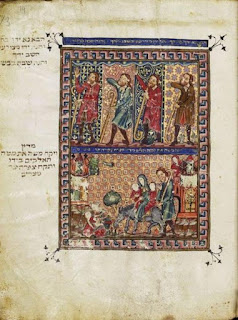A Midrash is a short text usually appearing in a classic Rabbinic
work from the first six centuries of the common era (Bereishit Rabba, Mekhilta,
Sifra etc).
The word itself is a conjugation of the Hebrew root D-R-SH, to
seek. It is the paradigmatic way Rabbis engage with earlier canonical texts
(usually but not exclusively Biblical verses) to … well to do all kinds of
things.
There is a vast school of Midrash – known as Midrash Halacha -
dedicated to explaining how every aspect of Rabbinic law can be derived from
(often microscopically close and highly creative) reading of Biblical verses.
But my great love is for Midrash Agada – folkloric, or narrative based,
Midrash.
The Biblical verse relays that Cain said something to Abel
before murdering him, but no words are reported. Most translators use ellipses,
as if Cain has been rendered speechless but Midrash suggests the brothers
argued as to who would inherit the world, or win the location of the Temple in
their territory, or …. The point isn’t to solve a ‘gap,’ in the way a
palaeontologist solves gaps in a fossil record, but rather to exploit openings to
be creative; harnessing a love and staggering command of the Biblical canon to render one verse capable of bearing additional
or new meaning, often by juxtaposing it with another.
The Holy Blessed One, said
to Abraham, “You said, "Let a little water be brought [for the angels
who came to visit you]" (Gen. 18:4). By your life, I [God] shall repay
your descendants [by providing water for them]; in the wilderness as it is
said, "Then Israel sang this song: Spring up, O well"
(Num. 21:17), in the land [of Israel]? "A land with streams"
(Deut. 8:7) and in the time to come, "In that day, fresh water shall
flow" (Zech. 14:8).
Bereishit
Rabba 48:10
This passage, one of six(!)
correlating reward in the wilderness, the land and the future to hospitable
actions Abraham performed for his visitors) is about more than an expression of
Biblical command. It inspires, in its readers, acts of kindness performed for
strangers, after all such actions motivate far off re-actions. And it serves as a
gentle reminder
that the world has a destiny, it is going to be OK; just as Israel survived the
wilderness and entered the land, so too we can have hope for the time to come. But
don’t imagine Midrash tends towards the pious, Midrash is impish and fearless,
poking fun at Rabbis and Romans with equal panache, and even taking on God who
can emerge as forgetful, priggish, even abusive, often through the Midrashic
technique of parable or Mashal.
In the Biblical account, God calls Abraham to, go before me
and be pure. “Mashal – what is this like? Like a King stumbling in the
darkness who calls on someone to light up their way.” (Bereishit Rabba 30:10). Abraham
is called, so are we all. Heschel, surely, was thinking of this Midrash when he
chose the title of his greatest work, God in Search of Man. Bakers knead dough,
and painters sketch. Rabbinic Jews Drosh. In doing so we seek God, but often
find God in search of us.
I teach, and stream, a weekly class in Bereishit
Rabba, Tuesdays 12:30. Contact rabbi@newlondon.org.uk for more
information.





No comments:
Post a Comment